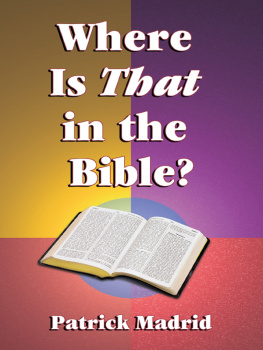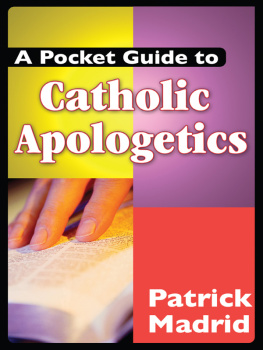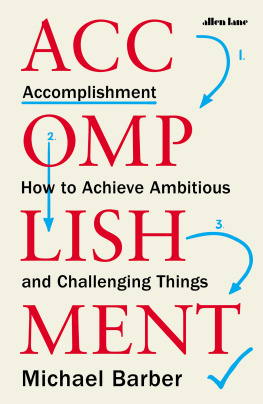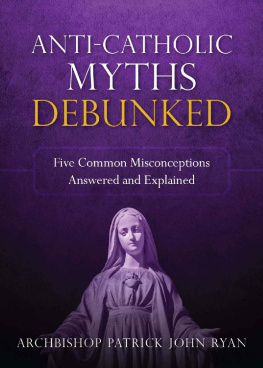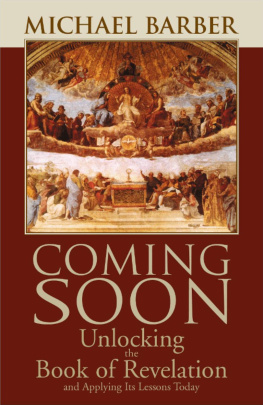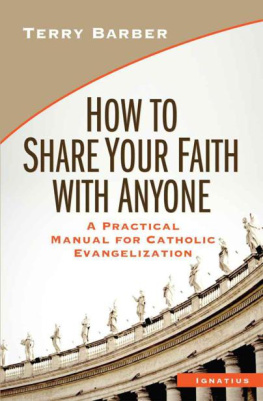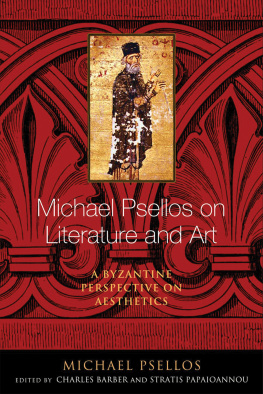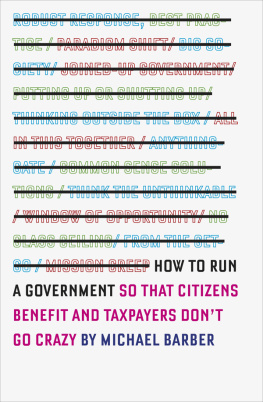Michael Patrick Barber - Salvation : what every Catholic should know
Here you can read online Michael Patrick Barber - Salvation : what every Catholic should know full text of the book (entire story) in english for free. Download pdf and epub, get meaning, cover and reviews about this ebook. year: 2019, genre: Religion. Description of the work, (preface) as well as reviews are available. Best literature library LitArk.com created for fans of good reading and offers a wide selection of genres:
Romance novel
Science fiction
Adventure
Detective
Science
History
Home and family
Prose
Art
Politics
Computer
Non-fiction
Religion
Business
Children
Humor
Choose a favorite category and find really read worthwhile books. Enjoy immersion in the world of imagination, feel the emotions of the characters or learn something new for yourself, make an fascinating discovery.

- Book:Salvation : what every Catholic should know
- Author:
- Genre:
- Year:2019
- Rating:4 / 5
- Favourites:Add to favourites
- Your mark:
- 80
- 1
- 2
- 3
- 4
- 5
Salvation : what every Catholic should know: summary, description and annotation
We offer to read an annotation, description, summary or preface (depends on what the author of the book "Salvation : what every Catholic should know" wrote himself). If you haven't found the necessary information about the book — write in the comments, we will try to find it.
Salvation : what every Catholic should know — read online for free the complete book (whole text) full work
Below is the text of the book, divided by pages. System saving the place of the last page read, allows you to conveniently read the book "Salvation : what every Catholic should know" online for free, without having to search again every time where you left off. Put a bookmark, and you can go to the page where you finished reading at any time.
Font size:
Interval:
Bookmark:
WHAT EVERY CATHOLIC SHOULD KNOW
WHAT EVERY CATHOLIC SHOULD KNOW
Michael Patrick Barber
Foreword by Brant Pitre
IGNATIUS PRESS AUGUSTINE INSTITUTE
San Francisco Greenwood Village, CO
Ignatius Press Augustine Institute
San Francisco, CA Greenwood Village, CO
Cover Design: Ben Dybas
2019 Ignatius Press, San Francisco,
and the Augustine Institute, Greenwood Village, CO
All rights reserved
ISBN 978-1-7335221-8-2 (PB)
ISBN 978-1-64229-082-0 (EB)
Library of Congress Control Number 2019935228
Printed in Canada
To Kim
Grace as Gods Merciful Gift
Saving Faith as a Gift
Returning to the Father
The Law and the Love of God
Fulfilling the Law
Salvation as Knowing the Lord
Redemption and the Debt of Sin
Redemption and Atonement
The Cross as the Revelation of Divine Love
The Church in the New Testament
One Bread, One Body
Is There Salvation outside the Church?
Grace as Divine Indwelling
Justification and the Protestant Reformation
Transformative Righteousness
Judgment by Works
Salvation as Compensation and the Concept of Merit
The Power of Grace
Salvation as Becoming Children of God
Maturity through Redemptive Suffering
Purgatory and Salvation
For Many Will Seek to Enter and Will Not Be Able
Mortal Sin and Severing Oneself from Christ
Taking Oneself to Hell
You Are Spiritually Blind... Yes, You!
Harden Not Your Hearts
The Need for Supernatural Vision
The Resurrection and a New Creation
Resurrection and New Life
Sharing in the New Adams Victory over Satan
by Brant Pitre
Why did God become man ? In other words, what was the reason for the Incarnation? If you had to answer this question with one word, what would you say?
Thankfully, if youre Catholic, you dont have to look far for the answer. You can simply turn to the words of the Nicene Creed, which sum up the essential points of the Christian faith. Every Sunday at Mass, Catholics throughout the world confess that Jesus Christ, the Son of God, came down from heaven for us men and for our salvation
Obviously, if the Church requires Catholics to recite these Sunday after Sunday, they must be important. But what do they mean? What exactly is salvation?
Although Ive been a Catholic all of my life, I must confess that I can count on one hand the number of homilies I remember that were focused on salvation or being saved. For whatever reason, Catholics nowadays often just dont talk that wayeven though Jesus himself declared that he came to seek and to save the lost (Luke 19:10). By contrast, when I was a teenager, my future wife, Elizabeth, was Southern Baptist, and I used to go to services with her on occasion. In her church, it seemed as if almost every sermon was about being saved. Virtually every Sunday, the gospel of the forgiveness of sins through the death of Jesus Christ would be proclaimed, and those who were not yet believers would be invited to come and receive the gift of salvation.
Now, theres an old saying of Aristotle: Nature abhors a vacuum. As a Bible professor, I sometimes like to alter it slightly: Theology abhors a vacuum. What I mean by this is that whenever any aspect of the Catholic faith starts to be neglected, what remains in the minds and the hearts of ordinary Catholics is not just a blank space. Instead, errors that get picked up here and there along the way inevitably rush in to fill the void. The end result is people who have wrong ideas about what salvation is and how it works. Oftentimes, many Catholics (and I include myself in this) dont even know that what they believe salvation is contradicts the Churchs teachings.
In his fantastic book, Salvation: What Every Catholic Should Know , Dr. Michael Barber takes the reader on a guided tour into the world of what theologians refer to as soteriology : the doctrine of salvation (Greek soteria ). The end result is a truly brilliant corrective to the many misunderstandings regarding salvation that have found their way into the minds and hearts of many Christians, including many Catholics. With writing that is both readable and charitable, Dr. Barber shows over and over again what salvation is not: it is not self-help (as in ancient Pelagianism and modern Therapeutic Deism); not mere fire insurance (as in Fundamentalism); not without cost (as in the Health and Wealth Gospel preached by certain televangelists); not just personal (as in Individualism); not just a legal transaction, a spectator sport, or simply a moment (as in some forms of Protestantism); it is not inevitable (as in Universalism); nor is it just about the future (as in some forms of Dispensationalism). Most important of alland as we all need to be reminded on a regular basissalvation is not just for other people. But thats not all. Even more importantly, Barber shows us what the Bible says salvation is . According to Scripture, salvation is returning to the Father; knowing the Lord; a revelation of divine love; an unmerited gift of righteousness that actually transforms us; a participation in the passion, death, and resurrection of Jesus Christ, and, above all, entering into the very life of the blessed Trinity: the Father, the Son, and the Holy Spirit. At every step, Barber makes a compelling case that this Catholic view of salvation is thoroughly and incontrovertibly biblical . While some discussions of salvationespecially the centuries-old debate between Protestants and Catholics over justification, faith, and workscan quickly veer off into technical philosophical and theological debates, this book makes an incredibly complex topic incredibly clear by keeping our eyes focused on what the Bible itself has to say about the subject.
In short, Dr. Barber has given us all a very precious gift: a book that shows both what Jesus Christ came into this world to save us from and, equally important, what he came to save us for .
What Is Salvation?
For I am not ashamed of the gospel: it is the power of God for salvation to every one who has faith...
Romans 1:16
Everything comes from love. All is ordained for the salvation of man. God does nothing without this goal in mind.
St. Catherine of Siena, cited in Catechism of the Catholic Church 313
Are you saved ?
The first time someone asked me this question I was a teenager. The context of the conversation was a memorable one. My parents had taken me and my five siblings on a trip to Northern California as part of a family vacation. We piled into a van, left our home in Southern California, and spent hours on the road. The journey took us on along a scenic route. We saw rugged mountains, shimmering lakes, and forested regions.
You might expect me to say that the remarkable vistas were the highlight of the trip. To be honest, I barely remember any of them. Instead, my clearest memory from that vacation was a brief exchange I had in the hotel lobby. I somehow ended up getting involved in a conversation about music with a group of kids my age. That is when things took an interesting turn.
Salvation: Past or Future ?
We were all naming our favorite musical artists when someone mentioned a singer who is well known in the Christian music industry. No one in our group recognized the nameexcept for me. My father had always enjoyed contemporary Christian music, and so I was familiar with the genre. When I seconded the kids endorsement, he was pleasantly surprised. He did not expect anyone to recognize the singer. It seemed like we had just connected on a new level. I suppose I should have seen what was coming next, but I did not.
The boy turned to me and asked, Are you saved?
Font size:
Interval:
Bookmark:
Similar books «Salvation : what every Catholic should know»
Look at similar books to Salvation : what every Catholic should know. We have selected literature similar in name and meaning in the hope of providing readers with more options to find new, interesting, not yet read works.
Discussion, reviews of the book Salvation : what every Catholic should know and just readers' own opinions. Leave your comments, write what you think about the work, its meaning or the main characters. Specify what exactly you liked and what you didn't like, and why you think so.

